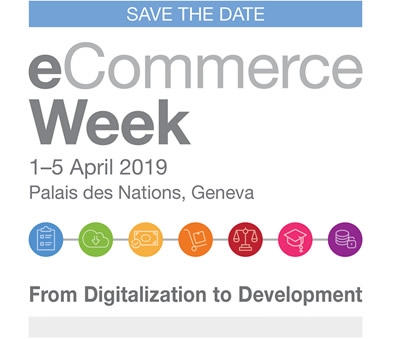Trusted universal connectivity and innovative partnerships to drive inclusive digital transformation
2 Apr 2019 11:30h - 13:00h
Event report
[Read more session reports and live updates from the UNCTAD E-commerce Week]
The session, organised by the Broadband Commission for Sustainable Development, was moderated by Ms Anna Polomska (Project Officer, ITU/Broadband Commission) who introduced the work of the Commission as working within the framework of the Global Advocacy Broadband Target 2025. Additional introductory remarks were addressed by Ms Nancy Sundberg (Senior Programme Officer, IEE/RME Telecommunication Development Bureau, ITU). She explained that the current broadband penetration is limited to 51% of the world population and that sustainable solutions need to be put in place to bring the rest of the population online, and to tackle the range of issues determining the divide such as the lack of access to technology, affordability issues or the lack of trust. As she explained, the presence of digital infrastructures is an important factor complementing the growth of GDP; nonetheless, this is necessary but not sufficient: people need to trust the service, share their talent and innovate. This can be done in a collaborative approach among all stakeholders. She then further advocated for an approach that puts people at the centre of the digital transformation, in which technology is at the service of the people.
Mr James Howe (Senior Adviser, ITC) addressed the issue of the absence of universal connectivity and argued that for an effective transition to e-commerce, the topic of connectivity should not be tackled in silos but be complemented by a better understanding of the complex ecosystem created by logistics, customers and skill-related issues. Moreover, he explained that in order to bring the rest of the world’s population online, new innovative approaches need to be put in place which should be adapted to the specific variables and interests of the local and national markets. Finally, he reinforced the concept of meaningful trust connectivity, stressing that considerations such as the ones on data protection and privacy play a huge role in the determination of trust in digital services.
Ms Imme Philbeck (Chief Economist and Director, Sector Development SAMENA Telecommunications Council) addressed the specificities of digital services, defining them as inevitably cost-dependent. She argued that their meaning and importance is different according to the sector in which they are contextualised, but she underlined that there is a need to enable digital services across sectors benefiting from the global dimension that digital services can have in their deployment. Finally, with regard to the strengthening of meaningful digital services, she stressed that a single solution cannot be identified due to the fact that the phenomenon is deeply context-dependent. However, initiatives fostering free e-government services could represent successful best practices.
Mr Ashley Lumsden (Head, UK Government Relations Huawei Technologies) brought an industry perspective to the panel. He explained that, from this perspective, the cost of deployment represents a crucial variable. In addition to that, other influent issues are related to skills, lack of broadband signal, lack of electricity or a combination of the previous factors. Recalling that the private sector has responded to the issue with sustainable solutions, he argued that more needs to be done in addressing pressing issues related to costs and lack of skills.
Mr Lars Erik Forsberg (Deputy Head, Unit European Commission) reaffirmed the crucial role played by digital tools for fostering development, and especially the crucial importance of connectivity. Moreover, he highlighted how in order to better foster trust in the services, there is a need to develop policy improving data protection and tackling cybersecurity, to cite a few. Finally, in addressing his speech, he underlined how technological evolutions have created challenges affecting Europe and Africa in a similar way. As a result, the European Commission has established a task force (composed by members of the European Union, African countries as well as other relevant stakeholders) for the discussion on how to reach affordability, accountability and inclusiveness of the systems.
By Stefania Grottola
Related topics
Related event

eCommerce Week 2019: From Digitalization to Development
1 Apr 2019 15:45h - 5 Apr 2019 15:45h
Geneva, Switzerland
